|
In late May, 2013, I conducted a survey of 688 Brazilian Jiu-Jitsu (BJJ) practitioners, 626 of which were male and 62 female. They ranged in belt levels from white to black, with ages ranging from children to seniors. The majority (682) are actively training, whereas 6 identify themselves as retired. 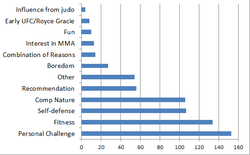 When asked what initially inspired them to try BJJ, the most widely selected answer was "personal challenge", with "fitness" coming in second. Refer to the chart to the right for a full list of responses. Like myself, 8 people surveyed wrote in that it was due to witnessing Royce Gracie in early UFCs, which most, if not all of those that practice BJJ, are familiar with. 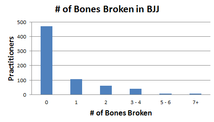 "As soon as I found out what BJJ was I [was] obsessed and amazed." As someone who has broken multiple digits while practicing jiu-jitsu in the couple of years I have been training I was not surprised to discover that over 200 surveyed have broken at least one bone. 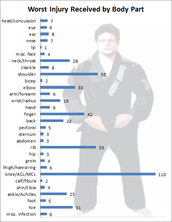 Participants were also asked to identify what they consider to be the worst injury they have ever received while practicing BJJ, and the most commonly reported major issue, by far, was knee related. Keep in mind while viewing the chart on the right that these are the "worst" injuries an individual has endured, not a collection of all injuries ever received by an individual. What is considered the "worst" was of the opinion of the individual taking the survey. Responses were grouped into like categories, arranged primarily by body part (e.g. knee injuries such as ACL and MCL tears were grouped together under "knee"). "[I] destroyed both [of] my knees..." 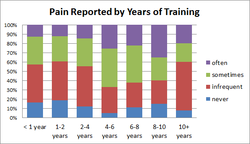 When it comes to pain, participants were asked how often they feel physically in pain, excluding training times, with examples such as arthritis, stiff knees, shoulder pain, trouble rotating joints, etc. The chart to the left shows the results of that question arranged by how long a BJJ practitioner has been training for, in years. You will notice a general trend of pain increasing, in terms of frequency, as a practitioner continues throughout the years, with a decline in the 10+ range, which may be the result of a small sample set (of the 688 surveyed, only 25 fit into the 10+ group). There seems to be a mixture of beliefs when it comes to strength and muscle in BJJ, whereas some feel strength is not very important, while others utilize strength, at least to a degree, and as such find it to be beneficial to lift weights and build muscle.
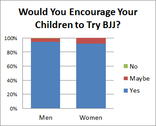 BJJ is a sport and art that one can start learning at a very young age. As with many sports, it's common for one's offspring to be encouraged into trying that activity, and BJJ appears to be no exception. Out of the 688 polled, only 4 people said they would not encourage their child to try Brazilian Jiu-Jitsu, all 4 of which are male. Overall, the responses between the men and women were incredibly similar. In BJJ we are taught to tap-out (or submit) when our opponent is choking us or manipulating a body part to the breaking point. But how many of us have been choked so badly that we passed out before we had time to tap-out (or because we had too much pride or ego to give up)? Of those surveyed, 29% reported they have been choked unconscious at least once. In the end, what I found to be the most interesting collective response to this survey was the reaction to the following question: If you could start all over again, would you still practice jiu-jitsu or take another path? Despite the broken bones, busted knees, and frequent pain felt outside of training by many, 99% responded they would do it all again. And as for the 1% (4 individuals), they are all still active practitioners. I would like to thank everyone that participated in the survey. Since I plan to run more surveys in the future I encourage you to drop a comment with suggestions for questions. 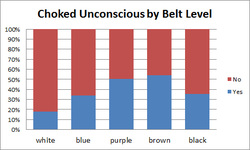 UPDATE (6/20/13): We have a discussion going on the sherdog.com forums, and a question was raised regarding the correlation between haven been choked unconscious at least once before as it relates to your current belt level. In other words, is there a connection between roughly how long you have trained for and if you have ever been "choked out"?. Please refer to the chart to the left, and keep in mind that the higher the belt level the lower the sample set.
7 Comments
bawlz
6/17/2013 11:01:32 am
interdasting
Reply
John Lothes
6/18/2013 05:10:42 am
I do research academically on martial arts and was wondering how you managed to collect your sample/data? I would love to be able to collect such a large number!!! Please email me and let me know, I would also be interested in collaborative research in the future.
Reply
I am happy to help and share information. I created a public survey via Google docs (free and easy to use) and then posted the survey via various social media platforms: Facebook, Twitter, and BJJ forums. I left the poll open for about 10 days and locked the doc once I was ready to start moving through my data. Let me know if you have any specific questions and feel free to email me -- novalin@gmail.com
Reply
Jon
6/21/2013 01:49:26 am
Great stuff! This is awesome. I really appreciate BJJ related surveys.
Reply
Brian
6/21/2013 01:01:48 pm
Thanks
Reply
ross
6/23/2013 02:31:26 am
Brian, To the question of people that have been choked unconscious; can you isolate the people that train at RGSF? I have personally been choked unconscious at least 3 times, always by people with higher belts then my self. As far as I can recall, only 1 of those occasions was because I did not tap (I thought I would be able to escape and was wrong) the other 2 were due to very tight/fast chokes. The point of this question is this: at RGSF (where we both primarily train) allows and encourages all belt levels to train together. I have visited other academies that have separate classes for each belt level. I wonder if the exposure to more experienced training partners leads to a higher rate of have been choked unconscious?
Reply
Brian
6/23/2013 04:15:20 am
I can definitely do that in the next survey. I'll ask where they people train, if they mix belt levels in rolling, how many times someone has been choked out, etc. to find out more.
Reply
Leave a Reply. |
AuthorBrian Riggsbee lives in San Francisco CA. He enjoys gaming, writing, creating art, practicing Brazilian Jiu-Jitsu, chasing adorable dogs, and spending time with his wife and boy. Categories
All
Archives
December 2022
|

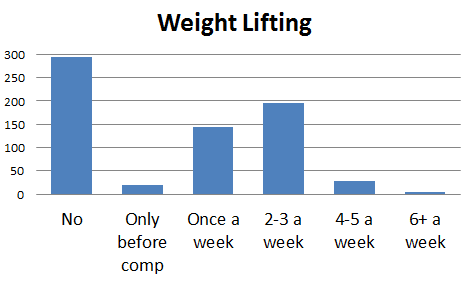
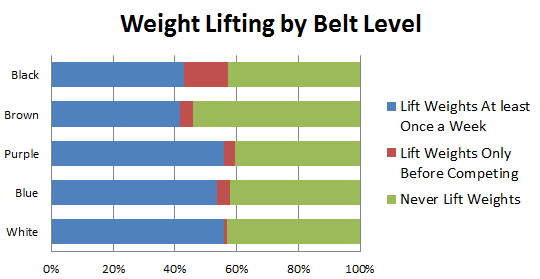
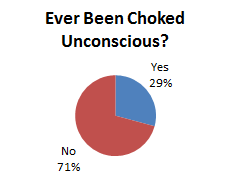
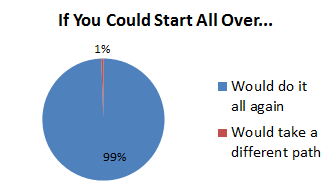

 RSS Feed
RSS Feed